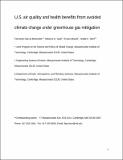| dc.contributor.author | Garcia Menendez, Fernando | |
| dc.contributor.author | Saari, Rebecca Kaarina | |
| dc.contributor.author | Monier, Erwan | |
| dc.contributor.author | Selin, Noelle E | |
| dc.date.accessioned | 2016-12-13T20:50:08Z | |
| dc.date.available | 2016-12-13T20:50:08Z | |
| dc.date.issued | 2015-06 | |
| dc.date.submitted | 2015-03 | |
| dc.identifier.issn | 0013-936X | |
| dc.identifier.issn | 1520-5851 | |
| dc.identifier.uri | http://hdl.handle.net/1721.1/105815 | |
| dc.description.abstract | We evaluate the impact of climate change on U.S. air quality and health in 2050 and 2100 using a global modeling framework and integrated economic, climate, and air pollution projections. Three internally consistent socioeconomic scenarios are used to value health benefits of greenhouse gas mitigation policies specifically derived from slowing climate change. Our projections suggest that climate change, exclusive of changes in air pollutant emissions, can significantly impact ozone (O[subscript 3]) and fine particulate matter (PM[subscript 2.5]) pollution across the U.S. and increase associated health effects. Climate policy can substantially reduce these impacts, and climate-related air pollution health benefits alone can offset a significant fraction of mitigation costs. We find that in contrast to cobenefits from reductions to coemitted pollutants, the climate-induced air quality benefits of policy increase with time and are largest between 2050 and 2100. Our projections also suggest that increasing climate policy stringency beyond a certain degree may lead to diminishing returns relative to its cost. However, our results indicate that the air quality impacts of climate change are substantial and should be considered by cost-benefit climate policy analyses. | en_US |
| dc.description.sponsorship | United States. Environmental Protection Agency. Climate Change Division (Cooperative Agreement XA-83600001-0) | en_US |
| dc.language.iso | en_US | |
| dc.publisher | Springer-Verlag | en_US |
| dc.relation.isversionof | http://dx.doi.org/10.1021/acs.est.5b01324 | en_US |
| dc.rights | Article is made available in accordance with the publisher's policy and may be subject to US copyright law. Please refer to the publisher's site for terms of use. | en_US |
| dc.source | Prof. Selin via Phoebe Ayers | en_US |
| dc.title | U.S. Air Quality and Health Benefits from Avoided Climate Change under Greenhouse Gas Mitigation | en_US |
| dc.type | Article | en_US |
| dc.identifier.citation | Garcia-Menendez, Fernando et al. “U.S. Air Quality and Health Benefits from Avoided Climate Change under Greenhouse Gas Mitigation.” Environmental Science & Technology 49.13 (2015): 7580–7588. | en_US |
| dc.contributor.department | Massachusetts Institute of Technology. Department of Earth, Atmospheric, and Planetary Sciences | en_US |
| dc.contributor.department | Massachusetts Institute of Technology. Engineering Systems Division | en_US |
| dc.contributor.department | Massachusetts Institute of Technology. Joint Program on the Science & Policy of Global Change | en_US |
| dc.contributor.approver | Selin, Noelle | en_US |
| dc.contributor.mitauthor | Garcia Menendez, Fernando | |
| dc.contributor.mitauthor | Saari, Rebecca Kaarina | |
| dc.contributor.mitauthor | Monier, Erwan | |
| dc.contributor.mitauthor | Selin, Noelle E | |
| dc.relation.journal | Environmental Science & Technology | en_US |
| dc.eprint.version | Author's final manuscript | en_US |
| dc.type.uri | http://purl.org/eprint/type/JournalArticle | en_US |
| eprint.status | http://purl.org/eprint/status/PeerReviewed | en_US |
| dspace.orderedauthors | Garcia-Menendez, Fernando; Saari, Rebecca K.; Monier, Erwan; Selin, Noelle E. | en_US |
| dspace.embargo.terms | N | en_US |
| dc.identifier.orcid | https://orcid.org/0000-0003-0235-5692 | |
| dc.identifier.orcid | https://orcid.org/0000-0001-5533-6570 | |
| dc.identifier.orcid | https://orcid.org/0000-0002-6396-5622 | |
| mit.license | PUBLISHER_POLICY | en_US |
